 Libri di Elisa Cattaneo su Unilibro.it
)
Libri di Elisa Cattaneo su Unilibro.it
)
|
|
2019 |
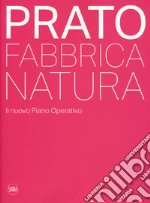 Title :
Prato. Fabbrica natura. Il nuovo piano operativo. Ediz. a colori
Title :
Prato. Fabbrica natura. Il nuovo piano operativo. Ediz. a coloriAuthor: Barberis Valerio; Cattaneo Elisa C. Publisher: Skira La molteplicità di operazioni prodotte negli ultimi anni a Prato, principalmente attraverso il recente Piano Operativo, è testimonianza di un fenomeno che merita di essere osservato e studiato. Il caso di Prato, attraverso la sua originale visione del tema ambientale, la sua intrinseca vocazione alla trasformazione e al riuso, l'imponente percorso partecipativo e comunicativo, ha messo in luce una nuova modalità di pensare la pianificazione urbanistica, delineando un nuovo approccio teorico/applicativo per la città contemporanea. Inscrivibile nella parentesi disciplinare nordamericana del Landscape Urbanism, il Piano Operativo evidenzia una specifica originalità metodologica, espressa attraverso il corpus degli obiettivi e delle strategie espresse, inquadrati principalmente in una lente transdisciplinare e innovativa, al punto da poter diventare un modello esportabile e virtuoso di pianificazione contemporanea. Già luogo di sperimentazioni urbane d'eccellenza ispirate dalla sua struttura di città fabbrica - tra le quali le tesi di Laurea di Branzi e Morozzi sulla piana tra Prato e Firenze, la celebre No-Stop City, gli studi sulla Città Operaia di Paolo Deganello, il Piano Strutturale di Bernardo Secchi - il nuovo Piano Operativo rinnova Prato come laboratorio urbano permanente, attraverso due strategie: la tecnologia della Natura e il progetto come ologramma del piano. Grazie alla solida esperienza, alle scelte operate dall'Ufficio di Piano e alle consulenze eccellenti - tra le quali quella di Stefano Mancuso sui Green benefit e di Stefano Boeri sulla Forestazione Urbana - € 54,00
Scontato: € 51,30
|
|
|
1918 |
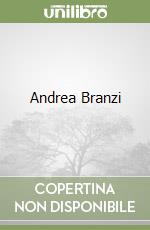 Title :
Andrea Branzi
Title :
Andrea BranziAuthor: Branzi Andrea, Cattaneo Elisa C. (EDT) Publisher: Baker & Taylor € 58,00
|
|
|
2016 |
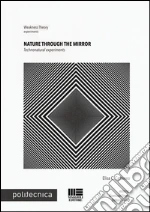 Title :
Nature through the mirror. Technonatural esperiments
Title :
Nature through the mirror. Technonatural esperimentsAuthor: Cattaneo Elisa C.; Finetti G. (cur.); Vermi D. (cur.) Publisher: Maggioli Editore 'Now, if you'll only attend, Kitty, and not talk so much, I'll tell you all my ideas about Looking-glass House. First, there's the room you can see through the glass that's just the same as our drawing room, only the things go the other way. I can see all of it when I get upon a chair all but the bit behind the fireplace. Oh! I do so wish I could see that bit ...Well then, the books are something like our books, only the words go the wrong way; I know that, because I've held up one of our books to the glass, and then they hold up one in the other room. 'How would you like to live in Looking-glass House, Kitty? I wonder if they'd give you milk in there? Perhaps Looking-glass milk isn't good to drink. But oh, Kitty! Now we come to the passage. You can just see a little peep of the passage in Looking-glass House, if you leave the door of our drawing-room wide open: and it's very like our passage as far as you can see, only you know it may be quite different on beyond. Oh, Kitty! How nice it would be if we could only get through into Looking-glass House! I'm sure it's got, oh! such beautiful things in it! Let's pretend there's a way of getting through into it, somehow, Kitty. Let's pretend the glass has got all soft like gauze, so that we can get through. Why, it's turning into a sort of mist now, I declare! It'll be easy enough to get through'. She was up on the chimney-piece while she said this, though she hardly knew how she had got there. And certainly the glass was beginning to melt away, just like a bright silvery mist. L. Carroll, Alice Through the Looking Glass, 1871 € 24,00
|
|
|
2015 |
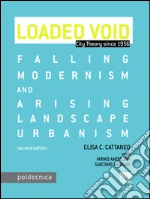 Title :
Loaded void. Falling modernism and arising landscape urbanism
Title :
Loaded void. Falling modernism and arising landscape urbanismAuthor: Cattaneo Elisa C.; Andolina Mirko; Ardesio Giacomo Publisher: Maggioli Editore 1956. Falling Modernism and Arising Landscape Urbanism. The selected essays are related to the hermeneutical circle established between Europe and the U.S. after World War II. Radically changing the 'geography' of architecture, this circle critically acts in the crisis of the Modern Movement. The year 1956 in particular sees the concurrence of specific conditions (Waldheim, 2009), which open up a Pandora's box in the research on the city: the 'Urban Design Conference' at Harvard University; the CIAM of Dubrovnik; the exhibition This is Tomorrow; the Alba Congress; and Hilberseimer's projects in Detroit. These analytical lines mark a first step in the deformation process of the dominant systems activated in architecture from the beginning of the century. Landscape Urbanism is the latest step. Very promising, it reverses the circle's direction, introducing North American research into European knowledge. The book considers Theory as the new Practice. To take power away from reality in order to introduce a new modality in knowledge, prior to a new shape: this is the first aim of the texts collected in this theoretical anthology. In order to create infinite platforms of research about the city. Elisa Cristiana Cattaneo Graham Foundation Grant Recipient in 2014, She is Adjunct Professor in Landscape Design at the Politecnico di Milano. She researches experimental ecological urbanism and its theoretical implications. In 2004, after a degree cum laude in Architecture and Urban Planning, she attended the European Master in Strategic Planning for the Architectural, Urban and Enviro € 29,50
|
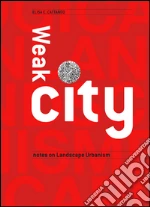 Title :
Weak city. Note on landscape urbanism
Title :
Weak city. Note on landscape urbanismAuthor: Cattaneo Elisa Publisher: Listlab 'Questa ricerca sull'urbanistica 'debole' è sia tempestiva che appropriata. L'argomento ha informato lo sviluppo del landscape urbanism un decennio fa ed è ugualmente evidente nel discorso emergente dell'ecological urbanism. Il metodo di lavoro di Cattaneo e l'ampia ricerca illustrano come la 'debolezza' sia arrivata ad occupare una posizione forte nei discorsi disciplinari e nelle pratiche progettuali delle arti urbane di oggi.' Charles Waldheim. 'Elisa Cattaneo si colloca all'interno del ristretto gruppo di architetti internazionali capaci di affrontare la crisi del design contemporaneo come occasione di riflessione epistemologica, indagando le complessità della filosofia e della scienza ben oltre un semplice malessere disciplinare. Si tratta di un lavoro difficile ma prezioso perché può sciogliere quei vincoli accademici che bloccano non solo il progetto come pratica conoscitiva e operativa, ma limitano anche in senso più ampio la conoscenza dello stesso ventunesimo secolo. Senza paura di risalire alle radici delle più remote avanguardie né alle più avanzate proiezioni di oggi, Elisa Cattaneo ricostruisce uno scenario di conoscenza capace di evidenziare quei nodi che sotto la definizione di 'pensiero debole' nascondono nuclei di un 'pensiero forte' atto a sbloccare la conoscenza del presente e delle sue potenzialità tanto complesse quanto inesplorate.' Andrea Branzi. € 14,00
|
|
2012 |
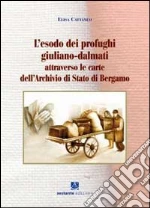 Title :
L'esodo dei profughi giuliano-dalmati attraverso le carte dell'archivio di Stato di Bergamo
Title :
L'esodo dei profughi giuliano-dalmati attraverso le carte dell'archivio di Stato di BergamoAuthor: Cattaneo Elisa Publisher: Sestante € 15,00
|